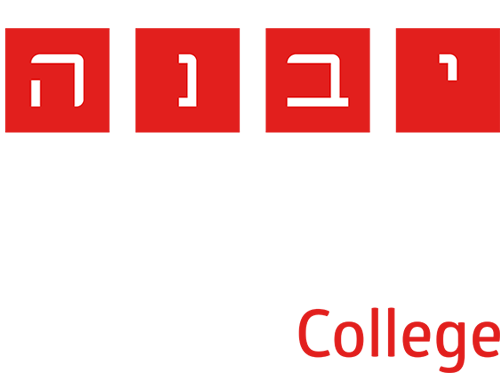Alumni medical students
We were delighted to welcome back some of our alumni Medical students who came in to speak to our current Year 12 students who are thinking of applying to Medicine next year
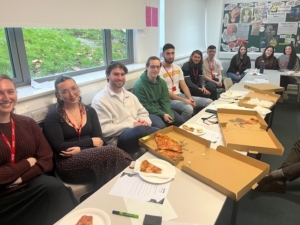
We were delighted to welcome back some of our alumni Medical students who came in to speak to our current Year 12 students who are thinking of applying to Medicine next year

Expert trainers from Talk The Talk came to Yavneh College on Monday, 18th December to work with students in Year 12.
Talk The Talk’s mission is to develop students’ oracy skills and communication confidence to support positive interaction in all life situations and improved social outcomes.
Talk The Talk has trained over 115,000 students to be confident communicators across England and Wales since they began in 2013.
The Talk About The Future workshop is an expertly led discussion and series of activities to support students to identify their own unique life experiences and skills and then develop their ability to use oracy to effectively articulate those experiences, skills and employability value.
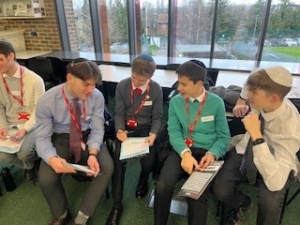


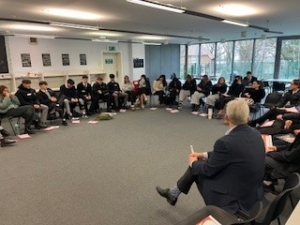

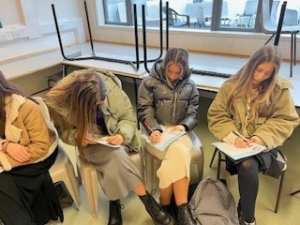
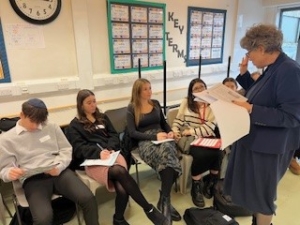
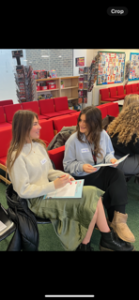
Year 11 had their second careers assembly this term with the head of Careers from West Herts College. The assembly focused on college life as well as the different post 16 courses and pathways on offer.
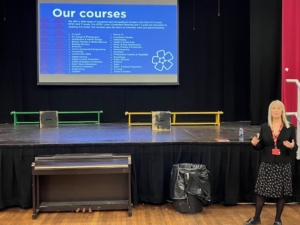
We welcomed back several of our alumni students to talk to our current Sixth Form students to talk about their post-18 apprenticeship pathways. It was so lovely to see all of our alumni students share their stories, advice and thoughts about the ever growing apprenticeship pathway. Thank you so much to all our alumni and guest speakers.









My experience with GSK(1,2) was not how exactly I expected it to be. I was expecting to be moving around a lot and shadowing workers as they demonstrated a typical day working in STEM. However, it was more focused on demonstrating the different possible routes available to anyone who wanted to approach STEM, regardless of background. The programme was heavily educational and allowed me to gain a more in-depth knowledge of how STEM is truly available to anyone. It was a truly amazing experience!
GSK is a global biopharma company with a purpose to unite science, technology, and talent to get ahead of disease. It prioritises innovation in vaccines and specialty medicines to prevent and treat disease. GSK reported sales of £29.3 billion in 2022. The company aims to positively impact the health of 2.5 billion people by the end of 2030. In 2022, GSK dropped their consumer healthcare side to focus on Oncology, R&D and Vaccines; their consumer healthcare is now handled by Haleon. Seemingly, this opportunity was used to enhance their company standards by focusing more on their employee welfare, ever since the announcement to move to a new headquarters. GSK now has various amenities within the current HQ to make GSK feel more comforting to employees and beneficial to mental health.
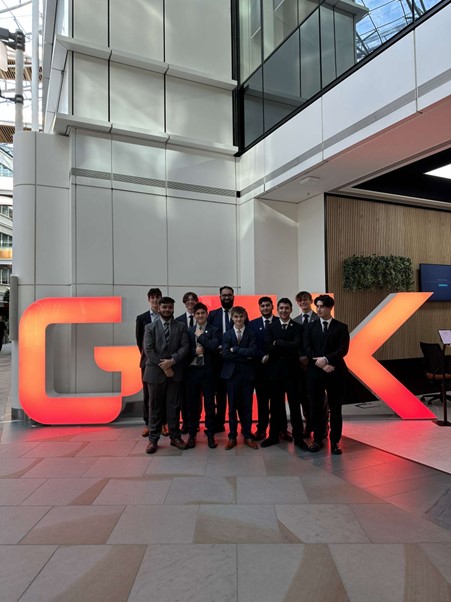
On the first day, I was introduced to all my peers who had also been accepted into the GSK STEM insight programme through a stringent application process. We were all introduced to each other through an icebreaker and a formal meeting with the GSK organisers. The first presentation was about the history of GSK and what changes they had made to the company in order to bring it into the forefront of innovation. We learned about the demerger with their consumer healthcare company and manufacturing to focus on their oncology, vaccines and respiratory healthcare products; the manufacturing company became Haleon. Now GSK has taken over smaller companies with developing products as there is now a priority on patient care over profits. We examined the basic process of Drug Discovery, the history of Medicine and the future direction of medicine. One of the final presentations was on the use of animals in research and how some countries require animal testing for the approval of vaccines, in order to prove efficacy and safety. We learned how GSK utilise animal testing for the development of their drugs and how GSK Stevenage have specialised rooms for animal testing to ensure animal welfare, owing to the strict regulations on Animal Testing. Finally, we studied the design of a clinical trial which was fascinating.
On the second day, we were introduced to Apprenticeships as an alternative to University. We examined at the GSK apprenticeship application process which was like that of experienced hires. We were given interview tips, with an emphasis on the STAR Format. There was a presentation on the vaccines GSK has developed, including Hep A, HPV and Tetanus. We studied the different types of vaccines and the phases of Clinical Trials. There was a presentation on Statistics in Clinical Trials and the role of Clinical Statisticians, who represent core members of R&D. There was an additional talk on how statistics could be used beyond analysis, in places such as Discovering Medicines and Designing Clinical Trials. Finally, we explored Drug Safety, which is known as Pharmacovigilance, and performed an activity where, as a group, we had to go through information provided to us and present our findings; it really helped to develop my Leadership skills. Beyond apprenticeships, we learned about the variety GSK Industrial Placements on offer whilst at University.
On the third day, we started with a Manufacturing Workshop, which involved deciding within a team setting who would perform certain roles to ensure that everyone was performing equally. It was a very good team building activity and gave me lots of teamwork and leadership skills; it was a great experience as it was fun to do – definitely one of the highlights of the week. Then we studied Anti-Microbial resistance and what steps are now being taken to combat this problem. Then we moved on to a presentation about HIV that was not from the viewpoint of GSK, however it was presented by a company called ViiV healthcare which is a Global Specialist in HIV treatment; ViiV was founded as a merger between GSK and Pfizer. We explored the history of HIV and the zoonosis of HIV which is the random mutation of animal pathogens that become established in human populations. It was believed that it may have become established in human populations through the hunting of Simians which had SIV (a similar disease) and was transmitted through blood contact in the same way HIV is and is the leading theory behind the zoonosis of HIV. We also learned of the different transmission mechanisms of HIV and the ways in which it is monitored and treated along with strategies in which transmission can be prevented and how a very large majority, if not all treatments, involve a combination of two to three different types of drugs. The presentation was one of my favourite presentations and showcased a very detailed record of HIV.
On day 4 we were given a presentation on Artificial Intelligence detailing its use in the BioPharma sector and its potential uses in the future advancement of medicine and STEM. We were introduced to the field in GSK that involves AI and Machine Learning, and the role of being an AI/Machine Learning Research Fellow. We were given a detailed account of the daily life of being a Research Fellow in AI, such as how you must keep on top of new advances in the field and propose new research directions due to the everchanging field, in addition to writing technical reports and articles, and presenting results to audiences inside and outside of GSK. We investigated AI types such as ChatGPT and MidJourney. It was very fascinating learning about the inner workings of AI and the ways it is trained, and how it has been perfected over time to become more efficient and effective. We did a fun interactive game to try and guess the password for a system by making the AI tell us what it was and trying to bypass security. It was a very enjoyable experience in terms of AI persuasion and the inherent dangers.
In a BioPharma setting, AI can be used to predict if a protein will bind to a target molecule which can vastly reduce the total experimentation time and can help to predict and to increase safety. However, it will not replace checks but will speed up the tests and thus the whole process. This will all lead to higher success rates for target molecules. This will lead to better drugs getting to more patients faster.
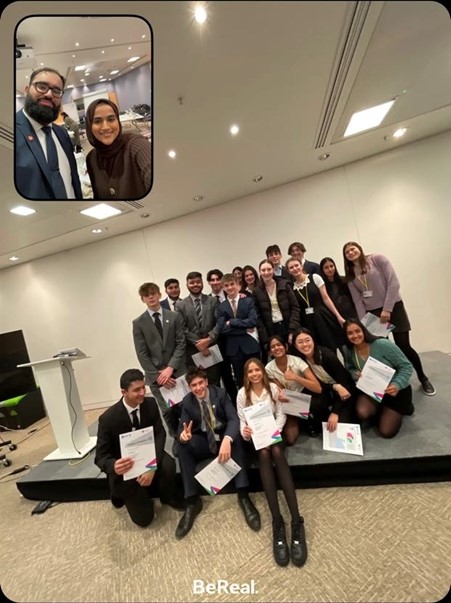
Another vast use for AI is the ability to predict who will and will not respond to drugs, as this is biggest strong suit of AI. Since all patients will respond to different drugs and diseases differently, AI can be used to split patients into categories and predict the response to different drugs, which will result in high success rates and less patience being subjected to adverse side effects. However, some diseases are very difficult to categorise which may result in a difficult time for AI to predict patient responses.
Finally, on the fourth day, we were given a presentation on Marketing and Branding. It entailed topics such as Pharmaceutical Market Access, Pharma Sales and the way that Pharma products can only be marketed to professionals and not the general public to avoid any confusion or persuasion.
On the fifth, and final day of the event, we were placed into groups, and all partook in a Molecule to Market Insight: Dragon’s Den Challenge. We put all our knowledge or drug development into use. We had to consider all the factors which we had learned throughout the week including Drug discovery, Clinical testing, Statistics and Branding. Our task was to develop a new treatment for Crohn’s Disease. From this cue, we planned a treatment involving Stem Cell therapy. We had to think about the side effects of the therapy in order to maintain quality customer care. This involved weighing up the job of curing the Disease versus treating it as a lifelong illness. Developing this treatment improved our communication and teamwork skills, while reflecting on the week. We had to present our product to peers and GSK staff where we spoke clearly with confidence in order to sell our product. I really enjoyed this Dragon’s den activity as it allowed me to get even closer with my peers and learn about how to apply my knowledge. I am extremely grateful for the opportunity, and I was very pleased that I graduated as an EDT(3) Industrial Cadet (Silver level). I would strongly recommend Yavneh College students to take up future opportunities because of the fun in working at GSK and the exciting career opportunities. What an amazing week I had at GSK!
Notes:
1This experience at GSK took place during October 23-27, 2023 at GSK in London, United Kingdom.
2GSK is a science-led global healthcare company: https://www.gsk.com/en-gb/
3EDT (Engineering Development Trust) are a nationwide educational charity set up over 35 years ago engaging young people through STE(A)M (Science, Technology, Engineering, Arts and Mathematics) focused experience days, projects and placements. We help young people develop the STEM skills, knowledge and experience they need to take control of their futures and change the world around them.
The author of this piece, Ariel Kosky, joined Yavneh College in 2018. His interests include Nanotechnology and Quantum Computing and his hobbies include Archery and Coding.
Edited by Dr. A. Ramlogan, Mathematics Department, Yavneh College
Tel: 020 8736 5580
admin@yavnehcollege.org
trustees@yavnehcollege.org
Company Registration Number
07643712 (England & Wales)
Opening Hours
8.30am – 4pm Monday, Wednesday and Thursday
8.30am – 3.25pm – Tuesday
8.30am – 1.30pm – Friday
Total 34.5 Hours per week

Hillside Avenue
Borehamwood
Hertfordshire
WD6 1HL
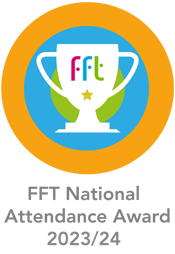
Executive Headteacher
Mr S Lewis BA (Hons) MA NPQH
pa@yavnehcollege.org
Honorary President
Mr Benjamin Perl MBE
pa@yavnehcollege.org
School Rabbi
Rabbi Alex Chapper
pa@yavnehcollege.org
General Enquiries
Mrs Hayley Fraser
SENCO
Mrs Lisa Tredler
senco@yavnehcollege.org
Safegaurding Lead
Mr M Kendler
admin@yavnehcollege.org
Chair of Yavneh College Academy Trust
Mrs Roz Levin
Chair of Yavneh College Local Governing Body
Mrs Susy Stone
Chair of Yavneh Primary Local Governing Body
Mrs Roz Levin
Chair of Yavneh Foundation Trust
Mr Richard Gilbert
